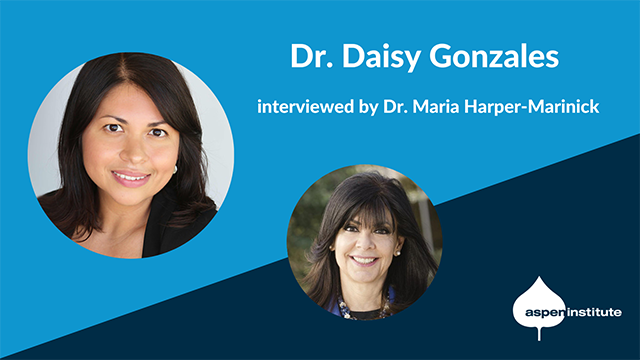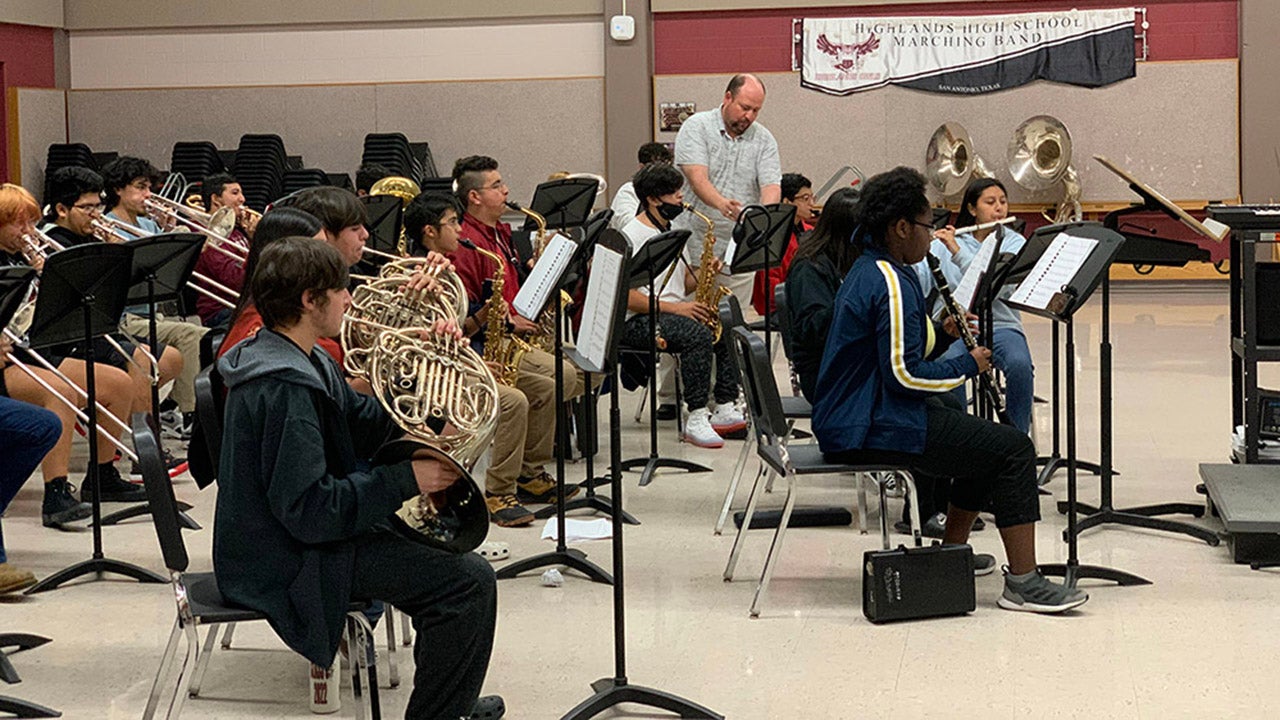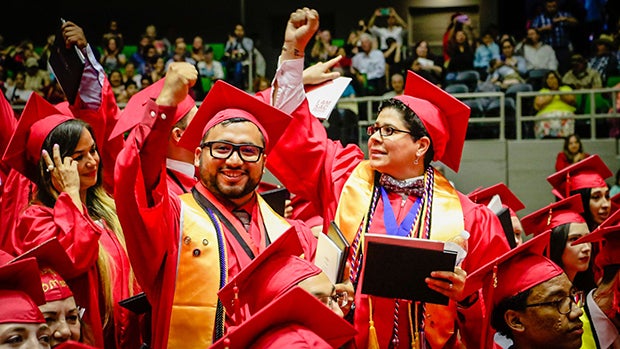Community colleges are underappreciated in American education. They educate more than a third of our nation’s undergraduates and a majority of America’s low-income college students. They are drivers of equitable economic mobility and developers of much-needed talent. Yet far too often, they struggle to deliver on their mission, and their enrollments continue to decline. At the College Excellence Program, we seek out and study the colleges that shine through initiatives like the Aspen Prize. We’ve found that the best colleges have one thing in common: transformational presidents.
Our mission is to develop the next generation of exceptional presidents via our Presidential Fellowships. We’re excited to celebrate the appointment of one of our fellows to the top job in the largest community college system in the country, serving nearly 2 million students. Last August, Dr. Daisy Gonzales was named Interim Chancellor of the California Community College System. In this conversation, she explores what that means with Dr. Harper-Marinick, a former chancellor and her fellowship mentor.

Dr. Maria Harper-Marinick: As we’ve celebrated, you are the first Latina and second woman to serve as the Chancellor of the California Community Colleges. Tell me about the unique perspective that you bring and how it impacts your leadership.
Dr. Daisy Gonzales: First, I want to say that I had amazing role models—including you! The primary identities I bring to this role are: my identity as a first-generation college student, a woman, and a Latina. Also, I just turned thirty-seven! I’ve thought long and hard about what it means to be in this role as a young woman and as a woman of color who looks like many of the students that California community colleges serve.
Too often, it has meant that when I enter a room, I’m already questioning whether I’m the right person to be there. Never mind titles—just being a leader. But the upside is that I’ve learned to navigate as a collaborative leader. In every room, even if we disagree, there is always something that we must share a love for, something we can accomplish together.
The last piece I want to acknowledge in my identity is that I come from a background that is not traditional to higher education. I have not spent my career in a college or a university. I spent my career as a teacher and a fiscal consultant, and then I fell in love with policy—mainly through finance. Why? Because, to me, budgets are statements of values.
Who I am and what I represent is a lived experience that shows us that higher education is about liberation and that when we bring diverse skill sets together to solve complex problems, we can leave the world a better place.
Harper-Marinick: You just provided a sampling of all of the dimensions of who you are. And yet we often talk about you as two of those dimensions: Latina and a woman. How are all your dimensions recognized as critical to the role?
Gonzales: Since starting this new role, I have heard several times, “You’ve never led a college!” And I like to remind people that I was a student—and how many college presidents can say they were students in this system or at a community college? One of the most important elements of leadership is either empathizing deeply with or living through the challenges you’re solving. I was a community college student. I was a foster youth. I entered a community college at sixteen and only graduated from high school because of community colleges. And now, somehow, by many, many miracles, and the help of many mentors, I’m here. I am one of California’s community college success stories. I wouldn’t be here without this system.
Harper-Marinick: As you said, that’s the power of community colleges, the impact on individuals and communities—a place for liberation. I love the way that you talk about it. So how does your experience as a California community college student inform your work?
Gonzales: I am such a proud community college alum. What I think of every day is how I ended up as a foster youth enrolling at a community college. I was sixteen. I was dropped off at six in the morning and didn’t know where I was going. I didn’t even know what time they opened! I sat on a bench for two hours, and the groundskeeper came up to me and said, “Do you need help?”
I was really shy back then—I said no! He watched me sit there for a long time, then came back and asked, “Are you sure?” And I admitted I needed help. He walked me to the admissions office and told me to fill out the application and financial aid forms.
Why do I share that with you? Because when we think about transformational change in this system, we often talk about culture change and how everybody plays a role, even our groundskeepers. And so, for me, it’s about helping people understand that we all love our students—and that means we love this system. And for this to be true, we must love innovation as a part of this journey because we must all be able to adapt and find our own ways to contribute to the transformation that will lead to every student belonging and succeeding at our colleges.
Harper-Marinick: It’s a common theme! That culture of care. But it’s stories like yours that remind us that every employee matters—that we are all part of that transformation. Shifting to the Aspen Presidential Fellowship—what did you gain through your experience?
Gonzales: I would not be here without Aspen. So many parts of the fellowship were key in my development as a transformational change leader. First, you—my mentor! I also had an incredible team that year—they became my role models too. I entered the fellowship as a researcher with a desire to understand how I might improve the professional development in the California system—but quickly, I started thinking, “Why not me? Why couldn’t I become a president?”
Another big takeaway was simply the affirmation that we were doing the right thing in California. At the time, we were in the middle of a transformation that centered student experiences in everything we did, from funding formulas to eliminating remedial education. It felt lonely! But the fellowship made me realize that I wasn’t alone, that our system wasn’t alone. So many other people were doing this work—and many were further along than we were.
Harper-Marinick: There are times when we are placed where we need to be at that time in our lives to do impactful work. You receive the gift of a particular time, space, and purpose, and then your gift to the world is taking advantage of it. So tell me about that particular time—your fellowship cohort graduated during the pandemic!
Gonzales: The pandemic accelerated the reflection I was doing. It accelerated everything—all of us as leaders were tested, and we could either throw our hands up in defeat or meet the challenge. And in the California system, we had to meet the challenge! Why? Take essential workers, for example. Firefighters, nurses, police officers—so many start at California community colleges.
Our colleges are open to all Californians who come to our doors. That’s how most community colleges operate in this country. We are open to one hundred percent of students. And our system serves one in four community college students in this country—and two-thirds of undergraduates in our state. That means that we are the front door of higher education. We’re here. We’re open. And since the pandemic, we’ve been restructuring to serve our learners better. We innovate to serve people.
Harper-Marinick: That’s so true. And yet—enrollments are dropping. They were pre-pandemic, and the declines have only accelerated. We know some groups are not coming back. It doesn’t mean the value proposition has changed. It doesn’t mean that the critical role that community colleges play in our communities has changed. Other factors have. So what messages would you want to share with prospective students?
Gonzales: I’d want to convey that we are one giant family. We serve everyone from young adults who just graduated from high school to adult learners: the dad who lost his job, the single mom, the incarcerated student. We serve this entire California family of learners. And we’ve been through a deep transformation as community colleges, much like the rest of this country. But we are one big family, and a family never gives up on each other! And in California, there are new resources and financial aid programs available, from specialized grants for displaced workers to reskill to new financial aid for students who enroll in baccalaureate degrees at community colleges. There has never been a better time to complete your education at a community college.
I’ve also been sharing this message with employers: “We are one big family, and we need you to be a part of this family.” We are the largest workforce training provider in the state, and we work hard to ensure employers are getting the skilled workers they need—but also, our students need access to great jobs and culturally responsive employers. Paid work-based learning is an investment in the future of our state and employers.
Harper-Marinick: You’re disrupting historical systems that typically do not think in your collaborative way. And the potential positive impact is life-changing! What can other states and communities learn from the work done in California?
Gonzales: Our work has resulted in deep transformation because we have focused on changing structures to be student-centered. We built an entirely new placement process to do away with remedial education, adopted a new funding formula, and even added baccalaureate degrees as a pathway for our students. Now the hardest part is achieving full implementation. You have to be patient because it is a journey. It takes constant work.
You implement, evaluate, pivot, and, above all, remain unapologetic to implement a vision. This is important because you change structures, but unless you fully see it though, you won’t fully achieve your goals.
And we have seen that clearly during this pandemic. We have lost male African American students at a historic record in this system. And recent data shows us deeper losses for Asian American and Pacific Islander students. If we want to eliminate inequality in higher education outcomes in ten years, we must keep going.
Harper-Marinick: What are you most hopeful about?
Gonzales: My students represent the future of leadership in this state across sectors. I will always make time to mentor, no matter what else is on my schedule.
Years ago, one of my students came to my office hours and shared that she found me on the campus website because she was looking to speak with a fellow Latina. She was ready to give up. Fast forward. Now she is Dr. Guerrero and is working at a community college. We change this world by creating opportunities through structural change. There’s not just one Daisy. There are so many amazing students who need us and have the potential to change this world.
I am also hopeful because last week, I got to announce the new interim deputy chancellor for our system, Dr. Navarette. She’s the second woman, the second Latina, to serve as deputy chancellor—and that’s huge for me because I always felt so alone in that role. And now, I get to make sure that she doesn’t feel alone—and we also made history and will continue to lead it.
Harper-Marinick: That’s what gives me hope—when we’re lifting up other people with us. And not making it about us as individuals, but making it about the communities that we serve and the communities that we represent. So congratulations!
Gonzales: Thank you, Maria. You are such a big part of where I am and who I am.
Harper-Marinick: I want other women to know—we have a responsibility to provide opportunities for and to celebrate each other. We need to be generous with each other!
Gonzales: I mean, I would have had to Google “women who lead state chancellor’s offices” to figure this all out—but instead, I got to meet you! And that was life-changing for other Aspen fellows and for me. Thank you for your contributions to higher education in this country and for going first!
Last year, I checked, and there were fifteen women nationwide who led state chancellor’s offices. And while many of us had “interim” or “acting” in the title, we are doing the work! We are leading a movement to educate America during a global crisis.
I can say much more about transformational change, but let me end here. For leaders like me to persist and succeed, we need Aspen as an active partner and unconditional supporter. But it’s not about training one president at a time. Imagine if the Aspen philosophy could be deployed across public higher education systems with accreditors supporting this work. A cohort of these leaders would create sustainable change.
This interview has been edited for length and clarity.


